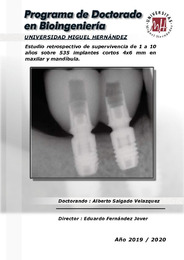Por favor, use este identificador para citar o enlazar este ítem:
https://hdl.handle.net/11000/27505Registro completo de metadatos
| Campo DC | Valor | Lengua/Idioma |
|---|---|---|
| dc.contributor.advisor | Fernández Jover, Eduardo | - |
| dc.contributor.author | Salgado Velazquez, Alberto | - |
| dc.contributor.other | Departamentos de la UMH::Histología y Anatomía | es_ES |
| dc.date.accessioned | 2022-07-14T11:42:56Z | - |
| dc.date.available | 2022-07-14T11:42:56Z | - |
| dc.date.created | 2021-05-14 | - |
| dc.identifier.uri | https://hdl.handle.net/11000/27505 | - |
| dc.description.abstract | Purpose The aim of this study was to analyze the survival and failure rate of short implants (6 mm) and to determine the prevalence and distribution of periimplantitis in the evaluated sample. Material and Methods This is a retrospetive study of 535 dental implants in 261 patients with a follow up time of 1 to 10 years were evaluated. Implants were placed in pristine or regenerated bone. Peri-implant marginal bone levels were measured yearly. Kaplan-Meier method was used to analyze the association between implant survival and follow-up time. Results The overall survival rate was 97.6%. Regarding factors influencing survival, 53% of the failures were related to smoking, more failures occurred in the maxilla and 10 out of 13 (76%) of the failed implants were diagnosed with periimplantitis (PI). Immediate implant placement also affected the survival rate negatively as 3 out of 27 immediate implants failed. Forty one implants were diagnosed with PI, in 7,7% of the sample. Eleven out of 167 implants that were loaded for more than 5 years presented PI, indicating a prevalence of 6.6%. Conclusion Short implants (6mm) placed in pristine or grafted bone have equal short and medium term survival rates compared to standard-length implants, even though survival rates were lower in the maxilla and in smoker as well as in immediate implant placement protocols. Periimplantitis was the main reason of implant failure accounting for 73% of the failures. | es_ES |
| dc.description.abstract | Objeto del estudio La finalidad de este estudio era analizar la tasa de supervivencia y causas de fracaso en implantes cortos (6mm) y determinar la prevalencia y distribución de peiimplantitis (PI) en la muestra evaluada. Material y método Se trata de un estudio retrospectivo sobre 535 implantes dentales en 261 pacientes con un seguimiento de 1 a 10 años. Los implantes fueron colocados en hueso prístino o regenerado. Los niveles de hueso periimplantario fueron medidos de manera anual. El método de Kaplan-Meier fue aplicado para analizar la asociación entre la supervivencia del implante y el periodo de seguimiento. Resultados La tasa total de supervivencia fue 97,6%. Respecto a los factores que influyen en la supervivencia, el 53% de los fallos estaban relacionados con el hábito tabáquico, en mayor proporción en maxilar y 10 de cada 13 (76%) de los implantes que fallaron fueron diagnosticados de periimplantitis (PI). La colocación del implante de manera inmediata también afectó negativamente a la tasa de supervivencia ya que 3 de cada 27 implantes inmediatos fallaron. Cuarenta y un implantes fueron diagnosticados con PI, en 7,7% de los tratados, 11 de 167 implantes con más de 5 años de seguimiento, presentaron PI, indicando una prevalencia del 6,6%. Conclusión Los implantes cortos (6mm) colocados en hueso prístino o injertado tienen una tasa de supervivencia a medio y corto plazo igual que los implantes de longitud estandar, a pesar de que la tasa de supervivencia fue más baja en el maxilar y en fumadores, así como en implantes inmediatos. La PI fue la causa principal de fracaso implantario estando presente en el 73% de los fallos. | es_ES |
| dc.format | application/pdf | es_ES |
| dc.format.extent | 87 | es_ES |
| dc.language.iso | spa | es_ES |
| dc.publisher | Universidad Miguel Hernández de Elche | es_ES |
| dc.rights | info:eu-repo/semantics/openAccess | es_ES |
| dc.rights | Attribution-NonCommercial-NoDerivatives 4.0 Internacional | * |
| dc.rights.uri | http://creativecommons.org/licenses/by-nc-nd/4.0/ | * |
| dc.subject | Implante corto | es_ES |
| dc.subject | Periimplantitis | es_ES |
| dc.subject | Supervivencia | es_ES |
| dc.subject | Estomatología | - |
| dc.subject.other | CDU::6 - Ciencias aplicadas::62 - Ingeniería. Tecnología | - |
| dc.title | Estudio retrospectivo de supervivencia de 535 implantes cortos 4x6 mm en maxilar y mandíbula | es_ES |
| dc.type | info:eu-repo/semantics/doctoralThesis | es_ES |

Ver/Abrir:
Salgado Velazquez, Alberto_compressed.pdf
8,17 MB
Adobe PDF
Compartir:
 La licencia se describe como: Atribución-NonComercial-NoDerivada 4.0 Internacional.
La licencia se describe como: Atribución-NonComercial-NoDerivada 4.0 Internacional.
.png)